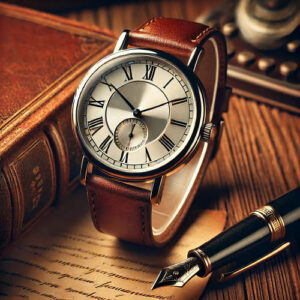Psychology of Wearing Watches: What Your Watch Says About You

Wristwatches, often viewed as mere time-keeping devices, hold a subtle power that extends far beyond their primary function. The act of wearing a watch has profound psychological effects, influencing our mental state and offering insights into our personal style and character. Whether it's the rugged resilience of a tool watch or the sleek elegance of a dress watch, each timepiece carries unique psychological significance and lends a sense of identity to its wearer.
This article explores the mental and emotional impacts of donning a timepiece, delving into the personal significance we attach to our wristwatches. By examining various watch types, from sporty chronographs to traditional timepieces, we can uncover what these accessories truly symbolize about an individual. Understanding the psychology behind watch-wearing not only enhances our appreciation for these intricate devices but also reveals the deeper layers of self-expression and identity they embody.
The Psychological Effects of Wearing a Watch
Mental Impact
Wearing a watch is more than just about telling the time. It significantly enhances mental faculties, particularly in terms of organization and discipline. By donning a timepiece on your wrist, you create a tangible connection to time management, enriching your productivity and ensuring tasks are completed timely.
Mental Benefits:
- Improved Organization: Regularly using a wristwatch enhances routine management.
- Increased Discipline: The constant reminder of time boosts commitment to punctuality.
- Enhanced Productivity: Helps in tracking time effectively, leading to better productivity.
Emotional and Cognitive Effects
Wearing a watch also plays a significant role in emotional and cognitive realms. A wristwatch symbolizes reliability and dependability, reinforcing the wearer's image as someone trustworthy. This can dramatically boost self-confidence, positively affecting social interactions and perceptions.
Positive Impacts:
- Dependability: Wearing a watch conveys trustworthiness and reliability.
- Self-Confidence: Enhances self-assuredness and professional image.
- Social Perception: Affects how others perceive your timeliness and seriousness.
Psychological Influence and Identity
Watches are profound tools for self-expression and identity. Each choice, whether it’s a luxury Seiko watch or a sporty chronograph, reflects the wearer's personal style and values. Watches serve as silent yet powerful forms of non-verbal communication, conveying messages about one's character and lifestyle choices.
Psychological Influence:
- Self-Expression: Watches reflect individual style and personality.
- Non-Verbal Communication: They signal traits, preferences, and values without words.
Examples of Watch Types and Their Psychological Messages:
| Watch Type | Message Communicated |
|---|---|
| Luxury Watch | Success, affluence, high standards |
| Sporty Chronograph Watch | Adventure, practicality, active lifestyle |
| Vintage Watch | Tradition, heritage, classic taste |
| Smartwatch | Modernity, tech-savvy, health-consciousness |
Through these nuanced roles, watches become extensions of one's personality, weaving practical functionality with profound psychological significance.
Personal Significance of Watches
Significance of a Watch in Different Contexts
Watches have a unique place in our lives, often carrying personal and emotional significance. When given as gifts, watches transcend their material value, becoming symbols of milestones, achievements, and cherished memories. They serve as a constant reminder of the bonds between the giver and the recipient, making them invaluable keepsakes.
In professional settings, a well-chosen watch can significantly impact first impressions. An elegant dress watch on your wrist can signal sophistication, reliability, and attention to detail, enhancing your professional image. Conversely, a tool watch can indicate a straightforward, practical approach, suitable for both business and casual settings.
Contexts and Significance:
- As Gifts: Symbolizes love, milestones, and achievements.
- In Professional Settings: Enhances first impressions, shows reliability and detail-oriented nature.
The Symbolism of Wearing a Watch
The wrist on which you wear your watch also holds symbolic significance. Wearing a watch on the left hand, typically the non-dominant hand, suggests a practical and organized approach to life. This placement often implies a person who values tradition and routine. On the other hand, wearing a watch on the right hand, often the dominant one, can imply personal control, assertiveness, and sometimes an unconventional approach.
Furthermore, wristwatches have long symbolized punctuality and precision. Even in an age dominated by digital timekeeping devices, choosing to wear a wristwatch exemplifies a commitment to reliability and time management.
| Watch Position | Psychological Implication |
|---|---|
| Left Hand | Practicality, organization, traditional values |
| Right Hand | Control, assertiveness, unconventionality |
Symbolic Meanings:
- Punctuality: Sign of reliability and respect for time.
- Precision: Reflects a meticulous, detail-oriented mindset.
Through these contexts and symbolic meanings, watches provide deep personal significance, mirroring one's identity and values.
What Different Watches Say About You
Types of Watches and Their Meanings
Wearing a particular type of watch can reveal a great deal about one's personality and values. Different types of watches symbolize distinct traits:
- Luxury Watches:
- Association: Wearing luxury watches like Rolex or Patek Philippe signifies success, high standards, and a taste for the finer things in life. These watches reflect an appreciation for quality craftsmanship and elite status.
- Tool and Sport Watches:
- Indication: Sporting a Seiko or Omega often signals a practical, adventurous personality. These watches are chosen for their durability and utility, making them ideal for active individuals who value functionality.
- Vintage and Traditional Watches:
- Preference: Opting for vintage pieces such as the Seagull 1963 indicates a preference for classic styles and a deep respect for tradition. These watches often evoke a sense of nostalgia and timeless elegance.
- Smartwatches:
- Reflection: Wearing a smartwatch like an Apple Watch suggests modernity, tech-savviness, and a focus on health consciousness. These timepieces are favored by those who prioritize connectivity and fitness tracking.
Types of Watches and Their Meanings:
| Type of Watch | Psychological Insight |
|---|---|
| Luxury Watches | Success, high standards, elite quality |
| Tool and Sport Watches | Practicality, adventurous spirit, reliability |
| Vintage and Traditional | Classic styles, tradition, heritage |
| Smart Watches | Modernity, tech-savvy, health consciousness |
Watch Materials and Design
The materials and design of a watch also carry significant implications about the wearer's personal style:
- Materials:
- Stainless Steel: This choice indicates durability, practicality, and modern elegance.
- Leather: A leather strap exudes classic sophistication and timeless style, appealing to those with a traditional flair.
- Other Materials: Titanium or ceramic options suggest a preference for innovation and a unique sense of style.
- Design:
- Minimalist Designs: These reflect a person's simplicity, clarity, and understated elegance, often hinting at a logical and clear-thinking mentality.
- Ornate Designs: Choosing an ornate design can indicate a love for detail, craftsmanship, and expressive fashion, suggesting a more vibrant and emotionally expressive personality.
Watch Materials and Design:
| Material | Personal Style Implication |
|---|---|
| Stainless Steel | Modern elegance, durability, practicality |
| Leather | Classic sophistication, timelessness |
| Minimalist Design | Simplicity, clarity, understated elegance |
| Ornate Design | Detail-oriented, expressive fashion, craftsmanship |
In essence, the type of watch you wear and its design elements speak volumes about your personality, values, and lifestyle, making them a powerful tool for self-expression.
Cultural and Social Aspects of Wearing Watches
Watches as Social Status Symbols
Watches have long been associated with social status and hierarchy. Historically, owning a fine timepiece was a privilege reserved for the elite. From the intricate pocket watches of nobility to the first wristwatches worn by aristocrats, watches have symbolized wealth, sophistication, and high standards.
In the modern era, the implications remain significant. Luxury brands like Rolex, Patek Philippe, and Richard Mille are often associated with affluence and success. Wearing these prestigious timepieces signals one's status and often aligns the wearer with notions of exclusivity and high social ranking.
Historical and Modern-day Perspectives:
| Aspect | Implication |
|---|---|
| Historical Watches | Nobility, elite status, sophistication |
| Modern Luxury Brands | Wealth, success, high social ranking |
The Role of Media and Celebrities
Celebrities and media play a pivotal role in shaping watch trends and perceptions. Watches worn by iconic figures in movies, such as James Bond's Omega Seamaster, have set benchmarks in style and desirability. These cinematic associations often elevate certain watch models to a status symbol, dictating trends in the horology world.
Moreover, social media platforms like Instagram and YouTube have become influential arenas where perceptions of watch-wearing are continually shaped and reshaped. Influencers and celebrities showcasing their prized timepieces can drive brand popularity and consumer aspirations. The rise of "watch influencers" has given birth to a cultural phenomenon where wristwatches are not just seen as functional accessories but as integral parts of personal branding and social identity.
Influence of Media:
| Medium | Impact |
|---|---|
| Movies and Celebrities | Trendsetting, aspirational symbols |
| Social Media | Brand popularity, consumer aspirations |
The Psychological and Practical Benefits of Wearing a Watch
Practical and Lifestyle Benefits
Wearing a watch offers numerous practical benefits that seamlessly blend into one’s lifestyle. Chief among these is improved time management. A wristwatch provides the convenience of checking the time effortlessly, allowing for better scheduling and productivity throughout the day. Unlike smartphones, which can be a distraction, a watch delivers information at a glance, fostering concentration and efficiency.
Maintaining a watch ensures its longevity, adding another practical layer to its usefulness. Regular servicing and care, such as ensuring water resistance and polishing, keep the timepiece in optimal condition, preserving its value and functionality over time.
Practical and Lifestyle Benefits:
| Aspect | Benefit |
|---|---|
| Time Management | Better scheduling, increased productivity |
| Convenience | Quick time-checks, reduced distractions |
| Maintenance and Care | Longevity, preserved value, optimal condition |
Psychological Benefits
Beyond practicality, wearing a watch profoundly impacts one's psyche. A wristwatch acts as a constant reminder of personal goals and commitments, helping individuals stay focused and motivated. This perpetual alertness helps in fostering a sense of accountability and conscientiousness.
Moreover, wearing a watch enhances the wearer’s sense of control and responsibility. The symbolic act of keeping track of time can translate into a heightened awareness of life's fleeting moments, prompting individuals to make the most of their time and uphold their commitments with integrity.
Psychological Benefits:
| Aspect | Impact |
|---|---|
| Reminder of Goals | Enhanced focus, motivation, and commitment |
| Sense of Control | Increased responsibility, time-awareness |
Combining these practical and psychological benefits, wristwatches serve as indispensable tools that enrich not just our daily routines but also our mental frameworks, offering a unique blend of functionality and profound personal significance.
Conclusion
In summary, the psychological effects of wearing a watch extend beyond mere timekeeping, influencing mental organization, discipline, and self-confidence. Watches carry profound personal significance, often reflecting milestones, achievements, and memories. Different types of watches—luxury, tool, vintage, and smart—represent diverse traits and values, from success and affluence to practicality and tech-savviness.
Wristwatches continue to captivate modern society, blending functional elegance with deep personal symbolism. They are more than accessories; they are extensions of our identity. As you wear your timepiece, consider what it conveys about your personality and lifestyle. Embrace its symbolism and let it be a reflection of who you are and what you value. Explore the world of watches and discover the unique stories and meanings they bring to your life.
